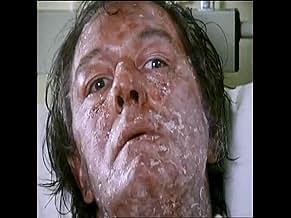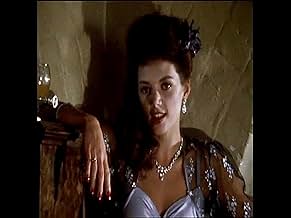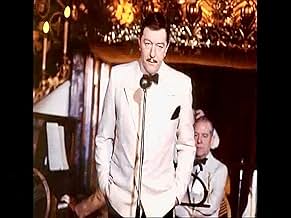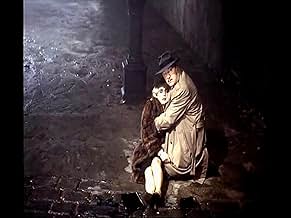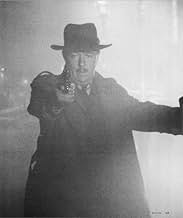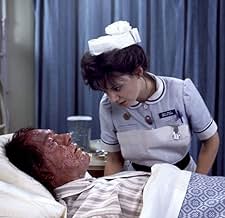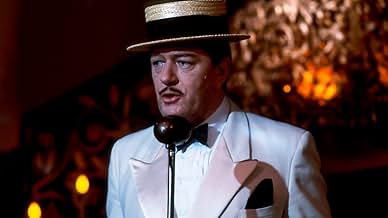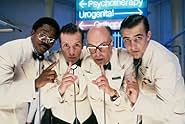The Singing Detective
- TV Mini Series
- 1986
- 1h 10m
Tormented and bedridden by a debilitating disease, a mystery writer relives his detective stories through his imagination and hallucinations.Tormented and bedridden by a debilitating disease, a mystery writer relives his detective stories through his imagination and hallucinations.Tormented and bedridden by a debilitating disease, a mystery writer relives his detective stories through his imagination and hallucinations.
- Won 3 BAFTA Awards
- 6 wins & 8 nominations total
Browse episodes
Featured reviews
About to watch the 'The Singing Detective' in its entirity for the first time in 18 years, one is filled with anticipation but also anxiety. Supposing it's dated, or that its once revolutionary nature has been so widely copied (one thinks here of its multi-layered structure, or the scene where Michael Gambon tries to avoid having an erection) that it will be impossible to remember quite how fresh it seemed on first viewing. Worst of all, perhaps it's simply not as good as remembered? When the piece started slowly, I feared that disappointment indeed awaited. But soon I fell again into its magical rhythmns, and, mesmerised, have just (with the aid of DVD) consumed the final five hours in a single weekend. Mesmerised but not surprised - the power of the piece is such that almost every scene, almost every line of dialogue seemed familiar. The last film I saw I had in fact seen previously, and much less than 18 years before, but I had forgotten it entirely and would not have even realised except for a one memorable detail. By contrast, in Dennis Potter's masterpiece, when a single scene failed to trigger recognition, it seemed horribly wrong, as every other incident was written on my brain.
For those who don't know, 'The Singing Detective' is an offbeat musical about a writer in hospital, that weaves effortlessly his present experiences, his past fictions, his paranoid imaginings and, above all else, the memories of a childhood that to this day still dominates his life. Wildly imaginative, but grounded in Potter's own autobiography, it constitutes an enormously rich and vivid telling of a fundamentally very simple story. Potter celebrates life, but refuses to assign it any false dignity. The extent to which he strips away the cant that helps make life bearable is truly disturbing, and perhaps explains the reason the religious right wanted it banned. The cover of my DVD says 'moderate nudity; mild language; no violence' and by modern standards this is correct. Which only damns the moderns; but Potter knew truly how to shock.
Put simply, everything is right about this series. The dialogue is caustic and hilarious; the direction spot on; the acting brilliant. The song and dance routines are coreographed precisely, economically, but to devastating effect. In fact, the construction of the whole work has the feel of jazz to it, the same themes repeated with minor variation, building to a whole that exceeds the mere parts. And the faces in this drama are the most wonderfully expressive faces you will ever see. I was going to call their expressiveness stylised, in that no-one's real face ever really gives away so much. But these, of course, are the faces of the memory, a lifetime's trauma captured in a single tearful eye.
The cast clearly rose to the material. Gambon gives a virtuoso acting masterclass, supreme in both his roles (he plays both the writer and his creation); and though the writer undergoes a major personal journey during the course of this story, Gambon is as good at the end as at the start. While Joanne Whalley, Bill Paterson (with his beard and accent, he makes me think of Robin Cook!) and (in a virtually silent role) Jim Carter have never done anything better. Often overlooked, meanwhile, is the stunning performance from (the subsequently obscure) Lyndon Davies from as Gambon's younger self.
Potter spent his entire career trying new ways of writing screenplays. It didn't always come off and after this work, little he produced was of merit. But 'The Singing Detective' hits no false notes. If there's been a better series made for television, I haven't seen it.
For those who don't know, 'The Singing Detective' is an offbeat musical about a writer in hospital, that weaves effortlessly his present experiences, his past fictions, his paranoid imaginings and, above all else, the memories of a childhood that to this day still dominates his life. Wildly imaginative, but grounded in Potter's own autobiography, it constitutes an enormously rich and vivid telling of a fundamentally very simple story. Potter celebrates life, but refuses to assign it any false dignity. The extent to which he strips away the cant that helps make life bearable is truly disturbing, and perhaps explains the reason the religious right wanted it banned. The cover of my DVD says 'moderate nudity; mild language; no violence' and by modern standards this is correct. Which only damns the moderns; but Potter knew truly how to shock.
Put simply, everything is right about this series. The dialogue is caustic and hilarious; the direction spot on; the acting brilliant. The song and dance routines are coreographed precisely, economically, but to devastating effect. In fact, the construction of the whole work has the feel of jazz to it, the same themes repeated with minor variation, building to a whole that exceeds the mere parts. And the faces in this drama are the most wonderfully expressive faces you will ever see. I was going to call their expressiveness stylised, in that no-one's real face ever really gives away so much. But these, of course, are the faces of the memory, a lifetime's trauma captured in a single tearful eye.
The cast clearly rose to the material. Gambon gives a virtuoso acting masterclass, supreme in both his roles (he plays both the writer and his creation); and though the writer undergoes a major personal journey during the course of this story, Gambon is as good at the end as at the start. While Joanne Whalley, Bill Paterson (with his beard and accent, he makes me think of Robin Cook!) and (in a virtually silent role) Jim Carter have never done anything better. Often overlooked, meanwhile, is the stunning performance from (the subsequently obscure) Lyndon Davies from as Gambon's younger self.
Potter spent his entire career trying new ways of writing screenplays. It didn't always come off and after this work, little he produced was of merit. But 'The Singing Detective' hits no false notes. If there's been a better series made for television, I haven't seen it.
The Singing Detective is one of those great works that inspire something deep within the viewer, leaving them both shaken and elated by the spectacle they have just witnessed. Few cinematic works can inspire such a feeling, let alone a work for television; and it is this sense of genius that elevates this work above the comparatively "okay" likes of say, Cracker, Brideshead Revisited, and Prime Suspect et al. This is down to the fact that The Singing Detective is a work far greater than anything else; a microcosm of life, love, anger, defeat, consciousness and the sub-conscious. It deals with the intricate realms of fantasy and reality, the written, the understood and the real. If this sounds complicated then we're on the right track, because this is one of Dennis Potter's most detailed narrative constructs. The story chronicles a writer's decent into personal hell, as well as a decent into a book being written in his own imagination and a book written many years before; with his past, present and future all jostling for our attention throughout the epic, six-hours-plus running-time.
It is a testament to Potter's ability as a screenwriter that the whole thing zips along so quickly, with the multi-layered story never pausing for a moment; constantly being carried along at every step by the combined genius of Potter's characters, the skillful and visually rich direction of Jon Amiel and that towering central performance from the brilliant Michael Gambon. The writing is truly ecstatic, with Potter obviously relishing every chance he gets to play with both the musical and detective-movie clichés - bringing to mind both Casablanca and Potter's own-classic Pennies From Heaven - whilst the dialog of Gambon's inner-monologues have more in common with the profane poetry of 60's playwrights that anything you'd expect to hear on BBC 2. The story also has obvious political overtones, with Potter using the hospital setting of the present sequences to double as an allegory of 80's Britain under the tyrannical leadership of Margaret Thatcher (bringing to mind the Elvis Costello song Tramp the Dirt Down and those other hospital set political parables, One Flew Over the Cuckoo's Nest and Britannia Hospital).
The story is also somewhat semi-autobiographical from Potter's point of view, with the writer, at this point in time, suffering from the same psoriatic-arthritis that Gambon's character Marlow has (creating that devastating, iconic image of the paralytic Marlow languishing half-naked in bed, being greased by a young Joanne Whally). There are also the much deeper autobiographical aspects with the young Marlow's childhood in the shady and evergreen Forest of Dean, in which the pastoral setting gives way to some truly shocking moments; recalling similar childhood traumas from such diverse examples as Iain Bank's Complicity and Rob Reiner's film Stand by Me. However, within this mire of bitterness, surrealism, bouts of lip-synced cabaret and phantasmagorical shoot-outs, there is also a great deal of humour. Anyone who has seen one of Potter's early TV plays or, for that matter, later classics like Karaoke and Cold Lazarus will know of his depth and range as both a humorist and a satirist; and it is this darkly acerbic wit that underlines the central narrative strands of The Singing Detective.
Some would argue that this is the best that television has to offer, though I would politely disagree. The Singing Detective is a work of art too good to be considered simply for television. Now, thanks to the magic of DVD we have the chance to experience Potter's classic in its definitive unabridged, unedited, uninterrupted from. A truly great piece of work.
It is a testament to Potter's ability as a screenwriter that the whole thing zips along so quickly, with the multi-layered story never pausing for a moment; constantly being carried along at every step by the combined genius of Potter's characters, the skillful and visually rich direction of Jon Amiel and that towering central performance from the brilliant Michael Gambon. The writing is truly ecstatic, with Potter obviously relishing every chance he gets to play with both the musical and detective-movie clichés - bringing to mind both Casablanca and Potter's own-classic Pennies From Heaven - whilst the dialog of Gambon's inner-monologues have more in common with the profane poetry of 60's playwrights that anything you'd expect to hear on BBC 2. The story also has obvious political overtones, with Potter using the hospital setting of the present sequences to double as an allegory of 80's Britain under the tyrannical leadership of Margaret Thatcher (bringing to mind the Elvis Costello song Tramp the Dirt Down and those other hospital set political parables, One Flew Over the Cuckoo's Nest and Britannia Hospital).
The story is also somewhat semi-autobiographical from Potter's point of view, with the writer, at this point in time, suffering from the same psoriatic-arthritis that Gambon's character Marlow has (creating that devastating, iconic image of the paralytic Marlow languishing half-naked in bed, being greased by a young Joanne Whally). There are also the much deeper autobiographical aspects with the young Marlow's childhood in the shady and evergreen Forest of Dean, in which the pastoral setting gives way to some truly shocking moments; recalling similar childhood traumas from such diverse examples as Iain Bank's Complicity and Rob Reiner's film Stand by Me. However, within this mire of bitterness, surrealism, bouts of lip-synced cabaret and phantasmagorical shoot-outs, there is also a great deal of humour. Anyone who has seen one of Potter's early TV plays or, for that matter, later classics like Karaoke and Cold Lazarus will know of his depth and range as both a humorist and a satirist; and it is this darkly acerbic wit that underlines the central narrative strands of The Singing Detective.
Some would argue that this is the best that television has to offer, though I would politely disagree. The Singing Detective is a work of art too good to be considered simply for television. Now, thanks to the magic of DVD we have the chance to experience Potter's classic in its definitive unabridged, unedited, uninterrupted from. A truly great piece of work.
There's no point in reiterating the praise for this miniseries. Many have called it the best television production ever, and as far as I can tell, they're absolutely correct. This is (NBC notwithstanding) the true definition of 'must-see TV'.
I just want to comment on something that struck me when I watched this recently on DVD. There's no way that an actor like Michael Gambon could ever get cast as the leading man in an American production (for TV or movies). He's just not physically attractive enough in the conventional sense; for example, he has the beginnings of a double-chin (more of a sloping-down from his chin to his collar), and I can't imagine any American producer being willing to give such an "not hot" actor so much screen time in the lead role.
Yet, it hardly needs be said, he is 100% perfect in this role, and it's hard to imagine anyone else doing as good a job. He can convey more feeling (rage, helplessness, love, hatred) in one close-up of his eyes than some actors do in their entire careers. His presence in this film is, in a sense, a reminder of how lucky we all are that it ever got made at all, by a BBC that was willing to give producer Kenith Trodd almost complete autonomy, as long as he stayed within budget. With the possible exception of HBO, you just don't see that sort of artistic freedom too often over on this side of the pond.
Anyway, as others said, it's a masterpiece, brilliantly written and brilliantly acted. Truly one of the most incredible uses of the television medium ever.
I just want to comment on something that struck me when I watched this recently on DVD. There's no way that an actor like Michael Gambon could ever get cast as the leading man in an American production (for TV or movies). He's just not physically attractive enough in the conventional sense; for example, he has the beginnings of a double-chin (more of a sloping-down from his chin to his collar), and I can't imagine any American producer being willing to give such an "not hot" actor so much screen time in the lead role.
Yet, it hardly needs be said, he is 100% perfect in this role, and it's hard to imagine anyone else doing as good a job. He can convey more feeling (rage, helplessness, love, hatred) in one close-up of his eyes than some actors do in their entire careers. His presence in this film is, in a sense, a reminder of how lucky we all are that it ever got made at all, by a BBC that was willing to give producer Kenith Trodd almost complete autonomy, as long as he stayed within budget. With the possible exception of HBO, you just don't see that sort of artistic freedom too often over on this side of the pond.
Anyway, as others said, it's a masterpiece, brilliantly written and brilliantly acted. Truly one of the most incredible uses of the television medium ever.
10adam_12
"The Singing Detective" very well may be the best thing done on television. Gambon is outstanding as the lead role, Marlow; he takes command of the performance so that you the viewer see Gambon as Phillip. The story is so rich and detailed with psychological questions that Marlow reflects on from his hospital bed; as you see him find resolutions to his questions, his skin condition becomes better. In the flashbacks, as he has more problems, it becomes worse. This is just one of many predicaments that Marlow faces throughout his time in his life. The story asks psychological questions about childhood, humans as sexual beings, the existence of God, and the healing (and destroying) powers of the mind. "The Singing Detective" is a quite cerebral and a brilliant show. SEEK THIS SERIES OUT and treasure it!
This is Dennis Potter's 'Sergeant Pepper' - the work of his life. One of those times when the recurring themes and characters from an artist's collected works come together at the right moment, with the right direction and the right actors.
The story is simple - embittered, sarcastic, over-the-hill author is admitted to hospital with a highly disfiguring skin condition. Whilst lying virtually helpless in his bed, he begins to rewrite one of his pulp novels (The Singing Detective) and to reminisce on his childhood in the Forest of Dean and London. But the memories and fiction start to overlap, with some hallucinations thrown in for good measure!
In the hands of lesser mortals, this could have been a disaster (I fear for the 2003 remake. Robert Downey Jr?!). But the direction of Amiel and the acting of the entire cast are outstanding. Michael Gambon is stunning as the (initially) sour and downright nasty Marlowe. That we sympathise with him given all of his shortcomings is testament to this.
The subtext is of a man exorcising his demons and coming to terms with his guilt: guilt about the death of his mother, guilt about his treatment of the women in his life, guilt about his victimisation of a schoolmate.
One of those films that is like a giant jigsaw - at first what appear to be a random collection of unrelated images which are rearranged, flipped over and pieced together. Ultimately we are presented with solutions to everything - almost.
After all, not everything has a solution...
The story is simple - embittered, sarcastic, over-the-hill author is admitted to hospital with a highly disfiguring skin condition. Whilst lying virtually helpless in his bed, he begins to rewrite one of his pulp novels (The Singing Detective) and to reminisce on his childhood in the Forest of Dean and London. But the memories and fiction start to overlap, with some hallucinations thrown in for good measure!
In the hands of lesser mortals, this could have been a disaster (I fear for the 2003 remake. Robert Downey Jr?!). But the direction of Amiel and the acting of the entire cast are outstanding. Michael Gambon is stunning as the (initially) sour and downright nasty Marlowe. That we sympathise with him given all of his shortcomings is testament to this.
The subtext is of a man exorcising his demons and coming to terms with his guilt: guilt about the death of his mother, guilt about his treatment of the women in his life, guilt about his victimisation of a schoolmate.
One of those films that is like a giant jigsaw - at first what appear to be a random collection of unrelated images which are rearranged, flipped over and pieced together. Ultimately we are presented with solutions to everything - almost.
After all, not everything has a solution...
Did you know
- TriviaThe first time Sir Michael Gambon was wheeled onto set in his full make-up, all the cast and crew were reduced to a stunned silence. Gambon broke the ice by saying "What's all this fuss about Chernobyl then? I went there for a holiday and it didn't do me any harm."
- Quotes
Philip Marlow: I used to think that all I wanted was the good opinion of honorable men and the ungrudging love of beautiful women. Now I know for sure that all I really want is a cigarette.
- ConnectionsFeatured in Arena: Dennis Potter (1987)
- SoundtracksPeg o' My Heart
(uncredited)
Music by Fred Fisher
Performed by Max Harris & His Novelty Trio during the credits
Details
Contribute to this page
Suggest an edit or add missing content



